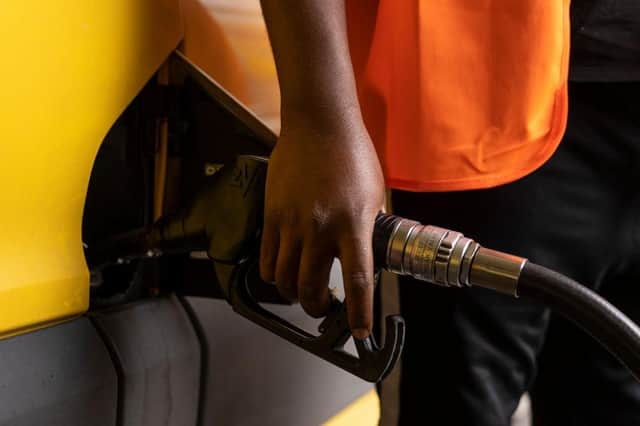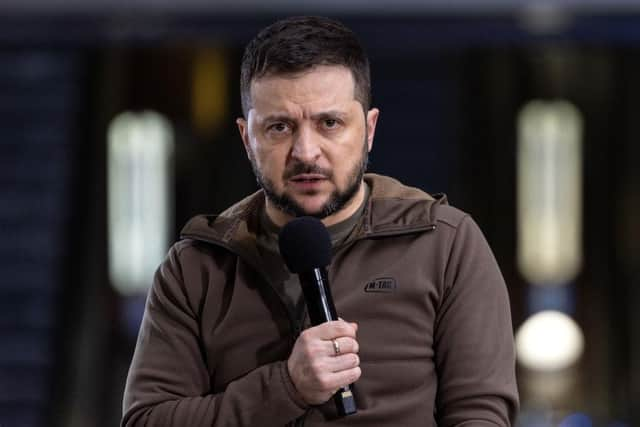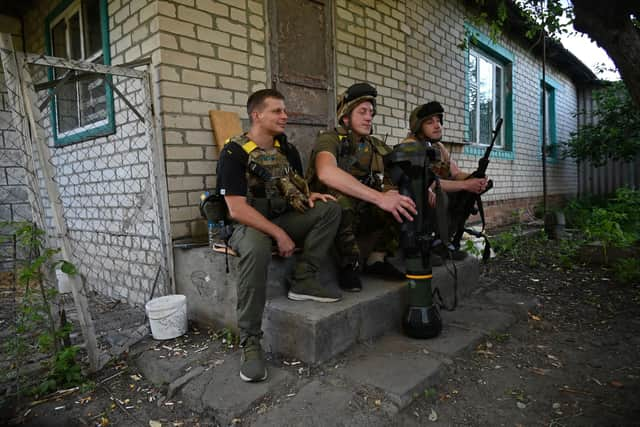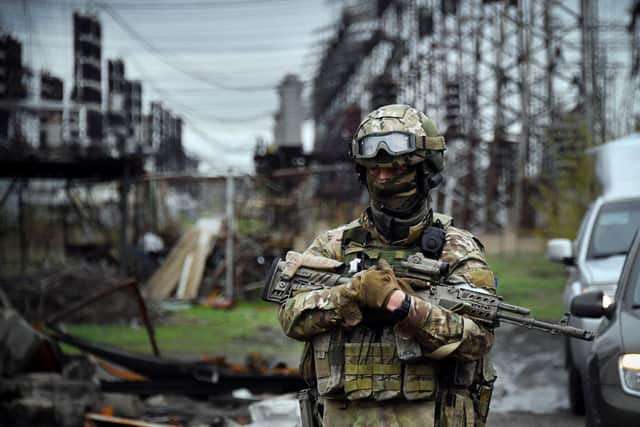Russia-Ukraine: Full economic effects of the war are 'still to be felt in Scotland'


The Russian leader cited the 21-year war with Sweden in the 18th century, where he insisted that the tsar “did not take anything from them, he returned [what was Russia’s]”.
His comments cemented what observers have known for some time: Mr Putin is in this for the long haul and he plans to take territory he believes belongs to his country. Hopes earlier on in the war that Russian setbacks could result in Ukrainian success are faltering.
Advertisement
Hide AdAdvertisement
Hide AdRussian defence minister Sergei Shoigu claimed 97 per cent of the Luhansk region – dubbed the Luhansk People’s Republic by Russia after its pro-Russian authorities declared itself an independent breakaway state early on in the war - had been “liberated" from Ukraine.


Yet in the Ukrainian media, there are still regular claims of Russian defeats. On Friday, the Ukrainian armed forces said Russia’s motorised infantry unit of the First Army Corps refused to fight after suffering heavy losses in Kharkiv Oblast.
Experts have warned the conflict between Russia and Ukraine could be perceived as reaching a stalemate – and that the West, which has been a staunch ally of Ukraine, could eventually tire of global effects of the war, such as the rocketing price of fuel – as well as shortages and rising prices at supermarkets.
Meanwhile, food inflation has accelerated to 4.3 per cent, according to the latest figures from the Scottish Retail Consortium, while the cost of filling a family car with fuel has risen to record high of over £100, in what RAC fuel spokesperson Simon Williams warned was a “truly dark day” for drivers.
Professor Luke March, deputy director of the Princess Dashkova Russian Centre at the University of Edinburgh, believes any potential negotiations could still be weeks away – although are becoming increasingly likely. He said Russia was using its state controlled media to “declare victories left right and centre”, but had lost the appetite to conquer the whole of Ukraine – at least for now.


He said: "It's clear that in the east, Russia's concentrating a lot more of its resources, its artillery and manpower, and it's making some some gains and causing, by all accounts, a lot of casualties. What’s changed is that after the initial shock waves where there were some withdrawals, they don't think they’re losing at all. They've got a few things now they can actually get some leverage with, a hold in territories which Ukraine will find it difficult to push them out of – as well as a stranglehold over exports of grain to the south.
"I think from the outside, it looks like a stalemate. Russia doesn’t really have the firepower to make massive quick gains, but it can consolidate what it's got and put a real squeeze on Ukraine, so there's a case for negotiations.”
However, he warned Ukrainian president Volodymyr Zelensky will find it difficult to persuade Ukrainians to support the acceptance of any possible peace deal.
Advertisement
Hide AdAdvertisement
Hide Ad

Prof March said: "Public opinion in Ukraine is increasingly anti-Russian because of the shock of what's happened and the atrocities that have been revealed. So there's always been a lot less manoeuvre for him than it looks from the outside, because a lot of the Ukrainians will keep fighting even if it's a losing cause.”
"It will come to a point where Ukraine will have the choice of coming to the table or getting pulverised even more, but I think we’re a few weeks off that - I don’t think Ukraine has any interest in doing this at the moment.
"The risk is always that Russia will consolidate, re-arm and do it again in a few years. The risk with any kind of peace deal is how trustworthy Russia is and it’s certainly not, from the Ukrainian perspective.”
He also worries public opinion in the West could start to change. A possible Republican resurgence at the US mid-terms could see a sway in stance from Washington, while the effects of economic problems on people’s lives could dent the staunchly pro-Ukraine sentiment, which has seen hundreds of Scots open their doors to refugees in recent weeks.
He said: "There's a lot more concern from outside about the end to this war, there’s definitely some misgivings and we’re seeing some repercussions as well in terms of food costs and fuel – and the sanctions [against Russia] aren’t having quite the desired effect yet.”
He added: “I think [a change of mood] will grow, definitely. I still think the sentiment in favour of Ukraine will persist, as long as it can be kept in the public eye, and as long as there are examples of Russian atrocities, and those are still coming to thick and fast. But again, once the conflict, is down to something that's more or less stable, it might be different.
“Putin is counting on that as well. Nothing's going to really shake them for the time being, but they'll know that Western leaders does come and go and that the Western public is fickle. Meanwhile, as we enter the winter, there is the issue of gas prices. Even if it’s not the dominant sentiment, it will be seen by the Kremlin as a weakening of the West.”
Ewan MacDonald-Russel, head of policy at the Scottish Retail Consortium, disagrees. Despite food price inflation being at its highest since 2012, he says the sentiment among businesses and consumer is still in support of Ukraine.
Advertisement
Hide AdAdvertisement
Hide AdRetailers have been key in the aid effort, from collecting products to be sent to the conflict zones, to organising charitable donations.
He said: "We're seeing an enormous customer, consumer and business response to supporting Ukraine through charitable work and donations. The feeling is quite resolute, there’s certainly no evidence that has shifted. Even with the pressures coming through, I think that kind of message of solidarity still seems quite strong, perhaps surprisingly, in the circumstances.
"We certainly don't have any evidence that that's shifted, or there's a sense that we should be putting pressure on things to just get sorted out. I don't think it’s seen that way at all.”
However, Mr MacDonald-Russell warned the full economic effects of the war are still to be felt in Scotland.
He warned that global food price commodities are “incredibly high”, pushed up by the crisis in Ukraine, while retailers are also being hit hard by rising costs of fuel, which has a knock-on effect throughout the whole supply chain.
He said: “We said [when prices began to rise] that this is going to get bigger. We are seeing that happening. And to be honest, it's hard to see where it's going to stop in the near future.
“Obviously lots of food from Ukraine was harvested last year, but this year, we just have no idea how much is going to go into the ground, or whether they can even get things out of the ground. So that's hugely challenging.”
Comments
Want to join the conversation? Please or to comment on this article.
